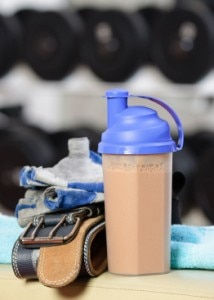Post-workout nutrition is arguably the most important meal of the day. The quality and timing of your post-workout nutrition can make or break your performance and recovery. In the last segment of Pre- and Post-Workout Nutrition, we discussed how to prime your body for peak performance and recovery with proper pre-workout nutrition. This week, we will dive into the most important nutrition principles surrounding the post-workout period to ensure you maximize your progress in the gym.
Assuming that your training goals are to improve performance and body composition (less fat, more muscle), proper post-workout nutrition and supplementation will help you reach your goals.
- The window: Following an intense training session, almost all athletes and fitness enthusiasts have the same goals: reduce recovery time and replenish depleted nutrients. To accomplish these goals, timing is just as important as content. In the first 45 minutes following a training session, your body is primed to absorb nutrients, build muscle and recover. After this 45-minute window elapses, your body will release certain hormones that have a negative impact on recovery and muscle development without proper nutrition. To optimize performance and get the most from your exercise routine, ensure that you get proper nutrition within 45 minutes of ending your training session.
- Liquid vs. solid food: During most periods of the day, solid food is superior to liquids in regard to health and physique development. By eating enough whole foods, you ensure that you are getting all of the natural components of food that your body needs to function at an optimal level — vitamins, minerals, protein, carbohydrates, fat, fiber and water. During the Post-Workout Period (within 45 minutes of ending a session), liquids are superior. The reason for this is fairly simple: it takes less energy to digest, absorb and assimilate the nutrients in liquids than it does solid food. This allows your body to replenish depleted nutrients as fast as possible and conserves energy that you need for full recovery. The best post-workout liquid options are whey protein, whey protein isolate, amino acid blends and fast-absorbing carbohydrates such as maltodextrin or waxy-maize.
- Macronutrients: The four categories of macronutrients are fat, carbohydrates, protein and water. During the post-workout period, you will want to focus exclusively on protein, carbohydrates and water. Protein will help repair and build your muscles, while carbohydrates serve to reverse negative hormones and deliver protein to your muscles. Avoid high levels of fat intake during this period, because fat slows down digestion and absorption of nutrients. It is also extremely important to ensure you are sufficiently hydrated for optimal recovery.
- Micronutrients: Micronutrients are nutrients that we require in small amounts for normal function. Most people refer to micronutrients as vitamins and minerals. The list below briefly touches on the most important micronutrients to consume during the post-workout period:
- Vitamin C — Vitamin C is a water-soluble vitamin and antioxidant that plays a crucial role in the repair of the body’s tissues.
- Magnesium and Potassium — Both of these electrolytes are depleted during intense exercise. Consuming adequate amounts of magnesium and potassium after a workout supports normal muscle contraction, relaxation, and function ““ all of which are crucial for recovery.
- B Vitamins — B vitamins play a very important role in a number of functions in the body, such as healthy cell function, energy production and metabolism maintenance. To ensure you are covering all of your “B” bases, look for a B-complex supplement that contains all of the essential B vitamins.

